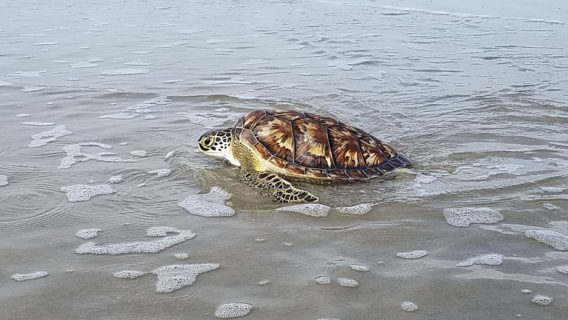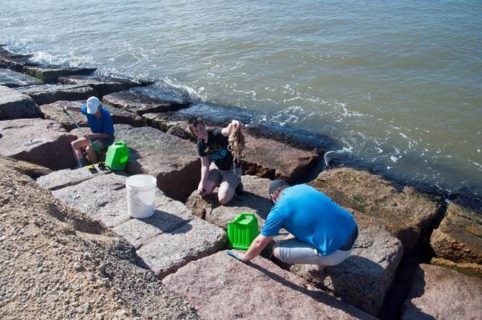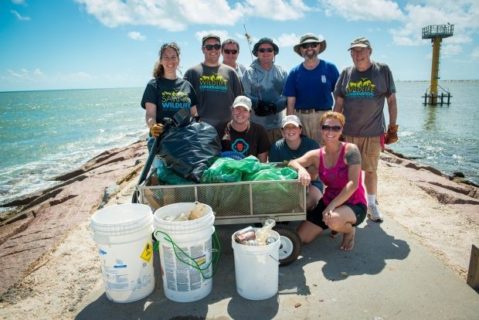Good News: The Zoo is Saving Sea Turtles
 Earlier today, you got to join Houston Zoo staff on a trip to the Gulf coast for a sea turtle release! The Gulf of Mexico is home to five different species of sea turtles: Kemp’s ridley, green, leatherback, Atlantic hawksbill, and loggerhead. All of these species are either threatened or endangered, but thanks to the collaborative effort of federal protections, scientists, non-profits, universities, grass roots organizations and many dedicated individuals, sea turtle populations are slowly recovering. The Zoo’s veterinary team plays a huge role in saving wild sea turtles, treating, and providing care for up to 100 injured or sick sea turtles each year.
Earlier today, you got to join Houston Zoo staff on a trip to the Gulf coast for a sea turtle release! The Gulf of Mexico is home to five different species of sea turtles: Kemp’s ridley, green, leatherback, Atlantic hawksbill, and loggerhead. All of these species are either threatened or endangered, but thanks to the collaborative effort of federal protections, scientists, non-profits, universities, grass roots organizations and many dedicated individuals, sea turtle populations are slowly recovering. The Zoo’s veterinary team plays a huge role in saving wild sea turtles, treating, and providing care for up to 100 injured or sick sea turtles each year.
 Rehabbing sea turtles so they are healthy enough to return to the wild is no easy feat. Just as restoring their health is important, it is equally important that the environment the sea turtles return to is clean and free of debris that could threaten their ability to thrive. In an effort to ensure their safety, our sea lion team has committed to leading a monthly cleanup where Zoo staff help a local jetty to stay clean.
Rehabbing sea turtles so they are healthy enough to return to the wild is no easy feat. Just as restoring their health is important, it is equally important that the environment the sea turtles return to is clean and free of debris that could threaten their ability to thrive. In an effort to ensure their safety, our sea lion team has committed to leading a monthly cleanup where Zoo staff help a local jetty to stay clean.
Since 2014, the sea lion team, along with other Zoo staff and volunteers, have made monthly trips to Surfside Jetty in order to collect as much trash, recycling, and fishing line from the site as possible. By removing these items from the jetty, they ensure that debris never makes it into the water where it would become an entanglement hazard for sea turtles and other marine wildlife. To date, these cleanups have resulted in the collection of over 1,900 pounds of recycling, 3,600+ pounds of trash, and 463 pounds of fishing line!
 Taking efforts a step further, the Houston Zoo has teamed up with a number of local organizations to create a campaign that encourages fishermen to save sea turtles by recycling fishing line they can no longer use in monofilament recycling bins. To do this, we ask fishermen to pose for a photo, pledging to recycle their fishing line to help save sea turtles. These photos are then publicly posted on a bulletin board near the entrance of their fishing site. This commitment process helps the community to practice a new behavior (recycling fishing line), and displaying photos of everyone in the community doing the same thing creates a sense of pride and a new identity for the community as sea turtle protectors.
Taking efforts a step further, the Houston Zoo has teamed up with a number of local organizations to create a campaign that encourages fishermen to save sea turtles by recycling fishing line they can no longer use in monofilament recycling bins. To do this, we ask fishermen to pose for a photo, pledging to recycle their fishing line to help save sea turtles. These photos are then publicly posted on a bulletin board near the entrance of their fishing site. This commitment process helps the community to practice a new behavior (recycling fishing line), and displaying photos of everyone in the community doing the same thing creates a sense of pride and a new identity for the community as sea turtle protectors.
When at the jetty, staff regularly spot sea turtles out in the water, and have even been involved in rescuing a sea turtle at the jetty that was entangled in fishing line, which reiterates just how important it is to keep our beaches and fishing sites clean. People are urged to call 1-866-TURTLE-5 if they find or accidentally catch a sea turtle so that an expert can assess the turtle and provide care if needed.
We cannot continue to save Texas wildlife without you. Your support is more critical than ever. Please support the Houston Zoo Fund to help us continue our work to connect communities with animals and inspire action to save wildlife.
